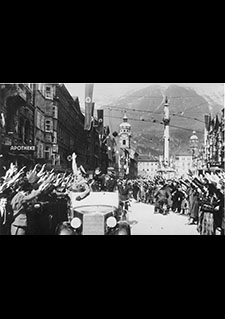Expansive Foreign Policy
The reintroduction of compulsory military service and the remilitarization of the Rhineland, the propagandized “homecoming” of the Saarland and, above all, the “Anschluss” of Austria (pictured) gave an impression of national consolidation at home. Germany had regained its former strength and the humiliation of the Treaties of Versailles had been vanquished – so thought the majority of the populace. The hosting of the Olympic Games in 1936 was seen as a sign of international acceptance of the regime.
The warm reception of British Prime Minister Neville Chamberlain, perceived to be the preserver of peace, in Munich made clear that the “Führer” and “Volk” did not have identical intentions in foreign affairs: Germans believed (or wanted to believe) in their “Führer’s” peaceful intentions.
Admittedly, other countries took another view. The international community had long since gotten a glimpse of the coming war: Guernica, a Basque city destroyed by the German Condor Legion city, was a test run for the bombardment of such cities as Warsaw, Rotterdam or Coventry. The Spanish Civil War was the “war before the war”.

